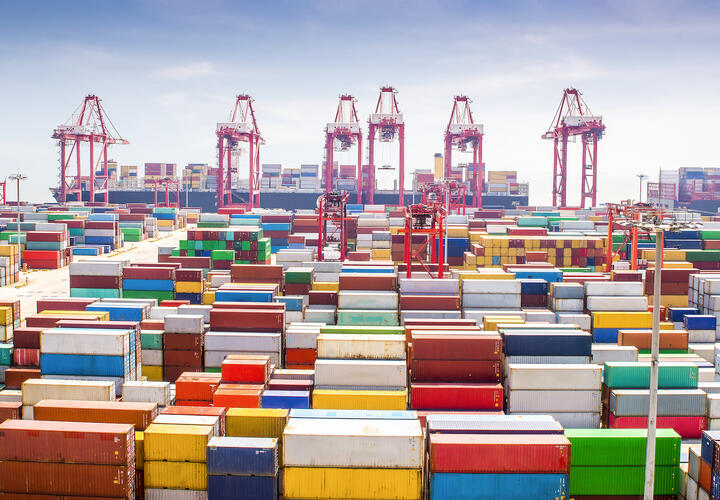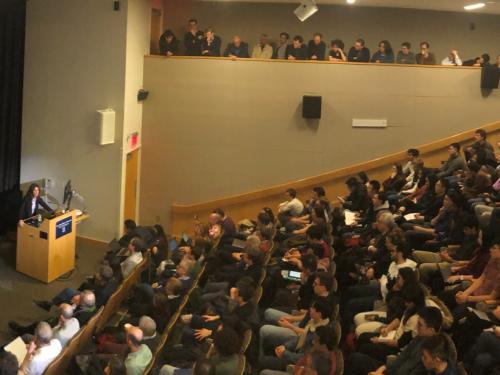Amit Khandelwal analyzes the short- and long-term effects of the US-China trade war

EGC Affiliate Spotlight: Amit Khandelwal
At the peak of the US-China Trade war in 2018-19, the US imposed tariffs on over $360 billion worth of Chinese goods, and China retaliated with around $110 billion in tariffs. These policies counteracted a trend in the US and other countries over previous decades of reducing cross-border tariffs to generate growth through global trade. What effects have these tariffs had since the trade war began, and what will be their long-term effects?
In two papers – one recently published in the Annual Review of Economics and the other in Working Paper form – Amit Khandelwal and coauthors analyzed the effects of the trade war on the American and Chinese economies, as well as its peripheral impacts on lower-income countries. This body of work represents a major focus of Khandelwal’s research and marks a new chapter his career, as he returns to Yale as the Dong-Soo Hahn Professor of Global Affairs and Economics and contributes to EGC’s renewed focus on trade as a determinant of development.
 Dan Renzetti
Dan Renzetti
A close-up view on cross-border trade
Khandelwal grew up outside Annapolis, Maryland, and frequently visited extended family in India. “I was able to see how economics can help understand the differences in the lived experiences of people like myself versus my cousins, who were the same age but living in a different part of the world,” he said in an EGC interview.
He recalled how, in preparation for a trip to India, his parents would fill large suitcases with American goods such as tennis rackets and watches to distribute to relatives. On their way back home, they would bring a variety of packaged foods unavailable in the US at that time. The suitcases became smaller and smaller over the years, as India liberalized its trade policies and goods became more widely available in both countries.
Khandelwal’s interest in economics as a field of study originated when participated in the Fed Challenge at his high school – a team competition sponsored by the US Federal Reserve – and then grew during his time as an undergraduate at Northwestern University and year abroad at the London School of Economics. He went on to complete a PhD focusing on development economics and global trade at Yale, then served as a Fellow at the Council on Foreign Relations, the Brookings Institution, the National Bureau for Economic Research, and the Bureau for Research and Economic Analysis of Development. He later taught economics at Columbia University for 15 years, while studying the structure and constraints of private sector firms in developing countries and producing more than 10 papers.
VoxDevLit: International Trade
Amit Khandelwal and David Atkin reviewed a broad set of empirical work that explores the impact of international trade in developing countries characterized by weak institutions, market failures and firm distortions. Watch Khandelwal and Atkin outline key takeaways in a VoxDev video.

“I generally view international trade as a really important force that can drive economic development,” Khandelwal said. In particular, he is interested in the differences between how international trade affects developed versus developing countries.
In the summer of 2022, Khandelwal was appointed full professor at Yale economics and the newly founded Yale Jackson School of Global Affairs, and returned to New Haven, along with his family. “He left us one of our most promising students, and he came back as an accomplished scholar,” said Penny Goldberg, Elihu Professor of Economics at Yale, Khandelwal’s former mentor and current coauthor.
“It's a great return home intellectually,” Khandelwal said, “and it’s really exciting to help build out a new school and be exposed to a broader range of students.”
The US-China trade war: at home and abroad
Despite being in the thick of a different research project when the trade war broke out in 2018, Khandelwal and his coauthor seized the opportunity to analyze the historical moment. “There was a sense that we could say something credible and informed in real time,” Khandelwal said.
According to Khandelwal’s analysis, the mutual tariff escalations that progressively rolled out marked a rupture in US trade policy history on scale with the Smoot-Hawley Tariff Act of 1930 – a protectionist policy that many economists believe exacerbated the effects of the Great Depression. However, it is difficult to pinpoint how these tariffs affected economies in the short and long term is a hard question to answer. This is because tariffs change the prices of goods at the border, and this affects the behavior of both consumers and producers. Since the beginning of the conflict in 2018, relations between China and the US have deteriorated under two American presidencies from opposing parties.
In a paper in the current edition of the Annual Review of Economics, “The Economic Impacts of the US-China Trade War”, Khandelwal and Pablo D. Fajgelbaum review what economists have learned to date about the trade war and its effects. “One thing that was surprising in this trade war is that the cost was fully passed on to the consumers,” Khandelwal said. When tariffs increase, firms face a choice of how much of the cost to absorb, and how much to pass on to consumers. This “pass-through rate” is tool to economists use understand the effects of trade policies. For example, tariffs that are passed fully to consumers makes them worse off, but the flip side of the coin is that it provides a shield for domestic producers. In previous tariff incidences, only about half of tariff changes were passed through to consumers. But, for reasons that still remain unclear, in the US-China trade war, all of it was.
In aggregate, the trade war lowered US and China GDP, although not by large magnitudes. But, because of the high pass-through rate, the trade war hurt consumers but made US producers better off. Moreover, since different parts of the US specialize in different sectors, the impact of the US tariffs and Chinese retaliations had different impacts across regions. For example, the Midwest, an agriculture-intensive region, was particularly hard hit by China’s retaliations on US agriculture.
Khandelwal argued in an op-ed in the Financial Times on June 8, 2022, that “tariffs can only help manufacturing jobs if they raise prices” and that the Biden administration should roll them back in order to fight inflation.
This analysis led the way to an investigation of the trade war’s effects on other countries. In a working paper, Khandelwal, his former Yale mentor Penny Goldberg, and their coauthors evaluated the trade policies of bystander countries in response to tariff increases between the US and China.
“I generally view international trade as a really important force that can drive economic development." – Amit Khandelwal
The research team observed that countries had widely varying responses to the increased tariffs on US and China. The response appears to hinge on how whether a bystander country produces goods that substitute for, or complement the output of the countries involved in the trade war. For example, when the US imposes tariffs on China, if a bystander country like Vietnam produces a close substitute for a product being taxed, it stands to increase its exports to the US. On the other hand, if it produces a good that complements Chinese products – such as a component of a machine made in China – its exports to the US could fall.
They found that the disparate responses of different countries do not depend on the wealth of the countries, but rather on their position as an exporter of substitute or complementary goods to the US and China and the flexibility of demand for these goods. In the interview, Khandelwal also theorized that “the countries that had in place more trade agreements than others tended to do slightly better, so it probably says something about how they're able to respond quicker because those agreements were already in place and the companies just naturally looked at them.”
The team utilized product-level global trade flows to track reallocation patterns of the US, China, and the “rest of the world,” finding that while the two economic superpowers reduced trade with each other, global trade overall actually increased by 3 percent. Bystander countries redirected exports from China to the US and increased exports to the rest of the world, resulting in what Khandelwal believes is not just a shuffling of goods, but rather a transition toward new international trade routes. In the past decade, support grew for the Trans-Pacific Partnership and the African Continental Free Trade Area, and Khandelwal believes new networks among lower-income countries will continue to grow in coming years.
Watch Pinelopi Koujianou Goldberg deliver the 30th Kuznets Lecture
Global trade has reduced poverty in low-income countries, but what happens when the West stops buying? Goldberg delivered the lecture" Poverty Reduction in the Era of Waning Globalization" on February 27, 2020.

Why bystander countries gave different responses to the trade war could hold valuable information about how to strengthen trade between lower-income countries. Khandelwal and his team plan to explore these driving factors in future research.
Turning to the future of supply chains
Khandelwal predicted that the trade war will be marked as “one of the early, large events among what I think will be many that will lead to a deterioration between US and China relationships.” He hopes to use surveys to understand effects of recent events on supply chains. “Companies were looking to move their operations out of China, and the trade war accelerated that and then the pandemic accelerated it even more.”
Khandelwal intends to examine if companies bring production back to the U.S. or simply move their supply chain to other parts of the world, and whether this will result in supply chains that are more resilient but less efficient. “I think in the next ten years there will be a lot of reshaping of global trade, in part because companies are now thinking very critically about where they want to source from,” Khandelwal emphasized.
Khandelwal’s breadth of methodological approaches is part of what sets his research apart, according to Goldberg. “Amit employs a mixture of structural modeling, randomized controlled trials [RCTs], and observational data. He was one of the very first in trade research to employ RCTs to understand questions related to exports and technology adoption.”
She added, “In my opinion, he is addressing some of the most important questions in international economics today.”
Written by Renée Sanacora